Etiqueta "PhoneGap"
Se han encontrado 7 Coincidencias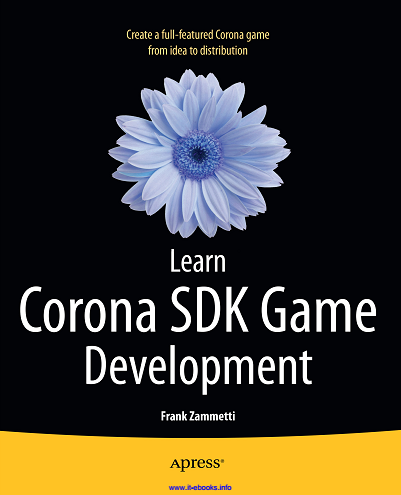
Learn Corona SDK Game Development
IT eBooks
147 Visitas | 191 Descargas | 2013-09-23 13:10:42 | jgramos
Writing mobile apps is hard. Writing mobile gamesis even more so. Why is that? Well, there are probably lots of reasons I could state, but one jumps to the forefront almost immediately: variety. The variety of platforms available today is staggering when you consider developing an application that runs everywhere. From iOS to Android, from BlackBerry to Windows Mobile, not to mention a number of lesser platforms, there are lots of places your app could run. Even if you simply concern yourself with the two market-share leaders, iOS and Android, it’s still a daunting task to develop for both. Sure, you could always develop two versions of the same application targeted for each platform, and plenty of times that’s exactly what is done. That approach, however, has the significant downside of requiring substantially different skill sets and tools, which means you generally need two sets of developers to maintain two completely (or nearly completely, anyway) code bases.
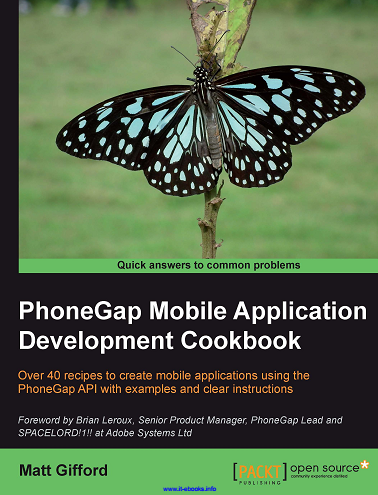
PhoneGap Mobile Application Development Cookbook
IT eBooks
183 Visitas | 1591 Descargas | 2013-09-23 13:14:32 | jgramos
In the summer of 2007, Steve Jobs changed the world by releasing the iPhone and boldly declared the future was web-based applications. A short year later, the story changed, but the vision remained. At this time I was working as "acting CTO" for a very small web consultancy called Nitobi (we gave ourselves joke titles and mine was actually SPACELORD!1!!). The iPhone SDK, not yet called iOS SDK, was just released and a few of my colleagues found themselves at Adobe in San Francisco for the iPhone Dev Camp. They arrived with the ambiguous idea to discover if it actually was possible to realize web technology for app development. Rob Ellis, Brock Whitten, and Eric Osterly succeeded in bridging the UIWebView to make native calls, and the first implementation of PhoneGap was born. A very short time later, Joe Bowser built an Android implementation. Dave Johnson, Nitobi's "real CTO", followed quickly with the BlackBerry implementation. Herein, PhoneGap got real. And then, less than a year from the first commits, in the spring of 2009, I found myself giving one of the first PhoneGap presentations at the first JSConf, and despite me being terribly scared, people loved it.

PhoneGap 2.x Mobile Application Development
175 Visitas | 4796 Descargas | 2013-09-23 13:19:47 | jgramos
Developing apps for mobile devices can be done using many different approaches and languages. Many apps are developed natively; meaning that they are developed in Java, Objective C, or some other language natively understood by the SDK available for the device. While native development allows the greatest flexibility and performance, the problem arises when you want to move an app from one platform to another: suddenly you're writing the app nearly from scratch. Then if you want to move to another platform, the same thing occurs. There's got to be a better way! All current mobile platforms support the idea of web apps. These are applications coded entirely in HTML and JavaScript. For simple apps, or for apps that don't need to interact with the device's capabilities, this works just fine. But the moment you need to access the file system, work with the camera, and so on, you start needing more access to the device. This is where PhoneGap comes in. PhoneGap (built on Cordova) wraps your HTML and JavaScript with just enough of a native app to let your web app feel more at home on the device. This wrapper is different for each platform, but exposes common capabilities in a consistent way. This helps you to write less code across multiple platforms.
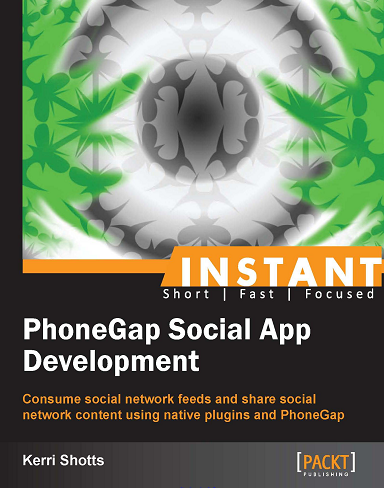
PhoneGap Social App Development
141 Visitas | 313 Descargas | 2013-09-23 13:24:45 | jgramos
Welcome to PhoneGap social app development. Social networking has changed the way we share information in our world. Where it used to be an e-mail to a friend (or even a letter!), now it's a tweet or a Facebook post, often for the world to see. What's even more amazing is how relatively young the various social networks are and how quickly they have changed the way we communicate and consume information. Because of this transformation, our apps need to support sharing to social networks, lest our app appear dated.
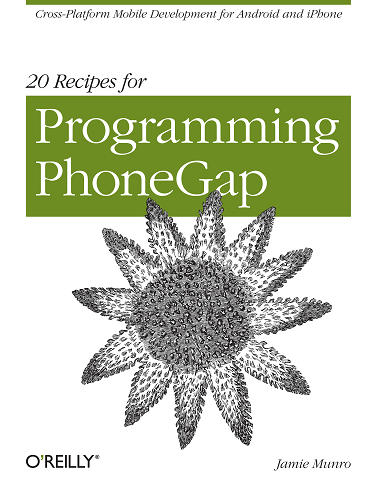
20 Recipes for Programming PhoneGap
158 Visitas | 381 Descargas | 2013-09-23 13:27:18 | jgramos
PhoneGap is a library that allows developers to interface directly with a mobile device through the use of its JavaScript libraries. With the multitude of mobile platforms it isvery difficult and expensive to create multiple applications in Java, Objective-C, or other native languages. Through the PhoneGap library, most web developers can convert their existing knowledge of HTML, CSS, and JavaScript into mobile phone applications with very little effort. In this book, I will explore many common features of mobile development and how they are accomplished with PhoneGap. This will include GPS location, maps, media, accelerometers, and much more.

Beginning PhoneGap
Programming applications for mobile devices
504 Visitas | 10581 Descargas | 2013-09-12 19:08:42 | moliver
PhoneGap is a growing and leading open-source mobile web apps development framework that lets developers build JavaScript and HTML5-based web applications with native wrappers for more than six mobile platforms, including iOS, Android, and BlackBerry. This framework lets you build HTML- and JavaScript-based apps and still take advantage of native mobile device capabilities like camera, localStorage, geolocation, storage and much more, irrespective of the mobile platform you target. It also lets you use more specialized JavaScript frameworks like jQuery Mobile and more. Beginning PhoneGap is a definitive, one-of-a-kind book that teaches the fundamentals and strategies behind cross-platform mobile application development. Instead of learning languages like Objective-C, focus on building apps from day one for Android, iOS, Blackberry, WebOS and Symbian—without the complexities of these platforms.
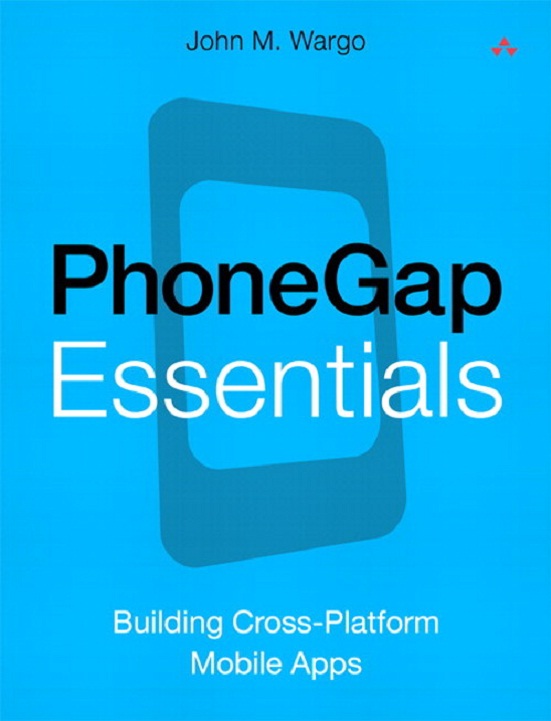
PhoneGap Essentials
PhoneGap
149 Visitas | 904 Descargas | 2013-09-23 17:30:56 | ybpadron
This book focuses on how to develop mobile applications using PhoneGap, which is a popular open source toolkit for building hybrid applications. You investigate the extensive PhoneGap API and learn how to include many of the device features in your applications. It will become apparent that PhoneGap delivers on the promise of a simplified, cross-platform mobile development by enabling you to write your application using web technologies and then packaging it up so that it can be distributed throughout the various app stores and markets. With any luck, your application may even become someone’s favorite app.
Contribuir
Usted puede contribuir con Libros UCLV, es importante para nosotros su aporte..
Contribuir